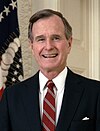
While attending a banquet hosted by Japanese prime minister Kiichi Miyazawa on January 8, 1992, American president George H. W. Bush fainted after vomiting onto Miyazawa's trousers at around 20:20 JST. Doctors later attributed the incident to a case of acute gastroenteritis.
Background
George H.W. Bush celebrated the New Year of 1992 with a 12-day trade-focused trip to Asia and the Pacific to discuss America's post-Cold War readjustment of economic relations and policies. On January 8, 1992, Bush played a doubles tennis match with U.S. ambassador to Japan Michael Armacost against Emperor of Japan Akihito and his son, Crown Prince Naruhito. The emperor and crown prince won.
That evening, Bush attended a state event for 135 diplomats held at the Japanese Prime Minister's residence. Between the second and third courses, Bush, who had been scheduled to give remarks at the dinner, fainted in his chair while vomiting onto Miyazawa's pants. First Lady Barbara Bush held a napkin to her husband's mouth until the United States Secret Service took over. While still on the floor, Bush quipped to his personal physician, Burton Lee, "Roll me under the table until the dinner's over." He assured dinner guests he had "influenza" and left for the evening. Barbara Bush later gave a speech in President Bush's place where she affectionately teased Armacost for the tennis game and jokingly claimed defeat was something her family was not used to.
The following day, January 9, spokesman Marlin Fitzwater said Bush had a mild case of gastroenteritis and he was feeling fine. That afternoon, Bush held a news conference with Akihito at the Akasaka Palace.
Aftermath
The incident was widely reported, coming just weeks before the New Hampshire presidential primary and became fodder for the nation's comedians. Footage of the President vomiting was broadcast on the ABC network. The incident was parodied by Saturday Night Live with a mock documentary featuring Barbara Bush trying to escape by crawling across the table.
Shortly after the incident, an Idaho man named James Edward Smith called CNN and posed as the president's physician, claiming Bush had died. A CNN employee entered the information into a centralized computer used by both CNN and its sister network CNN Headline News, and Headline News nearly aired it before it could be verified. Smith was subsequently questioned by the Secret Service and hospitalized at a private mental health facility for evaluation.
In Japan, Bush was remembered for this event for several years. According to the Encyclopedia of Political Communication, "The incident caused a wave of late-night television jokes and ridicule in the international community, even coining Busshu-suru (ブッシュする) which means 'to do the Bush thing'" (or "Bushing it").
According to a 2007 listicle published by USA Today, the incident was one of the top "25 memorable public meltdowns that had us talking and laughing or cringing over the past quarter-century."
In popular culture
- In 1993, the incident is spoofed in the comedy film Hot Shots! Part Deux.
- In the pilot episode of the animated sitcom television series King of the Hill, lead character Hank Hill recalls the time "George Bush went to Japan and vomited on their auto executives."
- The animated sitcom The Simpsons mentions the incident in the episode "Two Bad Neighbors" where Bush, during a brawl with Homer Simpson, says, "I'll ruin you like a Japanese banquet."
- The American alternative rock band R.E.M. mentions the incident in their song "Ignoreland" on their album Automatic for the People.
See also
References
- "Publication Papers of the Presidents of the United States: George H. W. Bush (1992, Book I)" (PDF). govinfo.gov. United States Government Publishing Office. 1992. Archived (PDF) from the original on 18 January 2021. Retrieved 8 November 2020.
- ^ "1992 Public Papers 52- Text of Remarks at the State Dinner Hosted by Prime Minister Kiichi Miyazawa of Japan in Tokyo". U.S. Government Publishing Office. 8 January 1992. Retrieved 8 November 2020.
- ^ McDaniel, Ann (January 8, 2017). "25 Years Ago Today, George H.W. Bush Vomited on the Prime Minister of Japan". Newsweek.
- ^ Wines, Michael (January 9, 1992). "Bush Collapses at State Dinner With the Japanese". New York Times. Archived from the original on 2009-09-28. Retrieved 2009-08-28.
President Bush fell suddenly ill and collapsed at a state dinner being given for him Wednesday night at the home of the Japanese Prime Minister.
- "Public Papers - George Bush Library and Museum". bush41library.tamu.edu. Retrieved 2020-11-08.
- "Bad Sushi - YouTube". www.youtube.com. July 23, 2006. Archived from the original on 2021-12-21. Retrieved 2020-11-08.
- Alexander, Scott (Aug 29, 2023). CNN starts to mistakenly announce President Bush is dead! THIS IS INSANE (VHS recording). YouTube.
- McDougal, Dennis (1992-01-10). "CNN Averts Hoax About Bush's 'Death'". Los Angeles Times. Archived from the original on 2013-01-31. Retrieved 2013-04-13.
- McKillop, Peter. "Letter from Japan: Back to the Future: Will George W. Bush carry on his father's (barfing) legacy?". Time Asia. Archived from the original on 2009-04-12. Retrieved September 19, 2009.
- Fallows, James (2009-10-19). "More on US presidents as Japanese words". The Atlantic. Retrieved 2020-11-08.
- Hersh, Brandon Jay (2008). "Bush, George H. W. (1924– )". In Kaid, Lynda Lee; Holtz-Bacha, Christina (eds.). Encyclopedia of Political Communication. Vol. 1. SAGE. p. 72. ISBN 978-1-4129-1799-5.
- Keen, Judy (May 7, 2007). "They did what, said what?". USA Today. Archived from the original on 2012-04-16. Retrieved 2017-08-28.
- Kevin Jackson (August 16, 1993). "FILM / It's not hot and there's no shots in it: Hot Shots: Part Deux] is the latest exercise in movie parody from Jim Abrahams. Kevin Jackson met him". The Independent. Archived from the original on September 2, 2018. Retrieved September 2, 2018.
External links
| Diplomatic posts | |
|---|---|
| Diplomacy |
|
| World War II |
|
| Incidents |
|
| Military relations | |
| Related |
|

